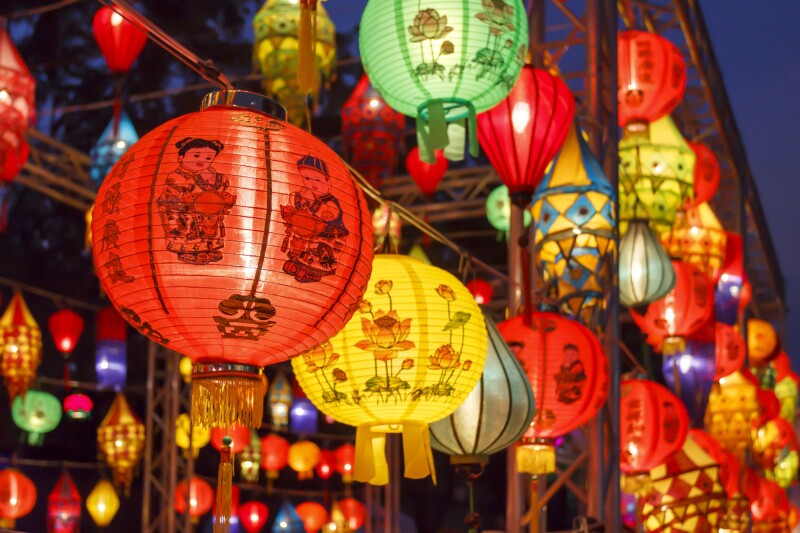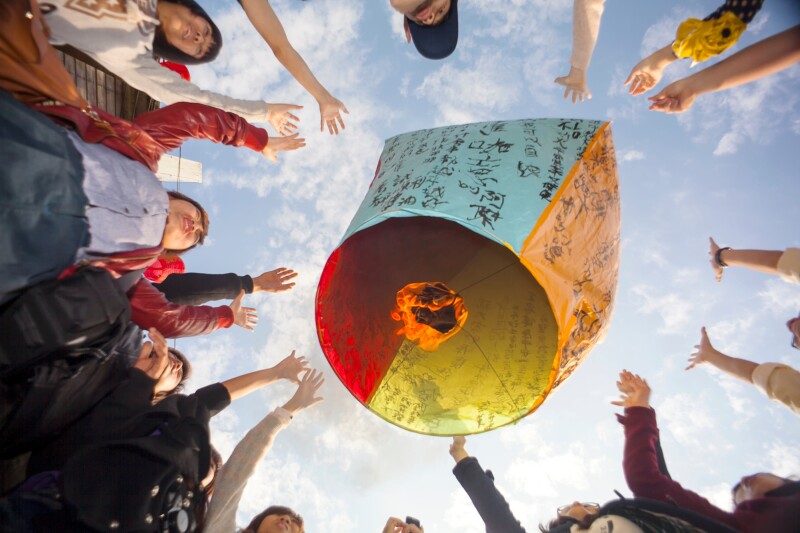Lanterns have been used for centuries throughout countries in Asia to commemorate cultural and spiritual celebrations. Sky lanterns can be traced back thousands of years to the Eastern Han Dynasty in China (25–220 C.E.) when the objects were used not only as decorative light sources but also as military signals that could communicate messages across long distances.
The history of lantern festivals is also believed to have begun during the Han Dynasty, though no one is certain when or how they came about. One theory goes that on the 15th day of the Lunar New Year, monks would light lanterns in honor of Buddha, and eventually other people caught on to the custom and began lighting lanterns in honor of loved ones who had passed. Another more fanciful explanation goes that the Jade Emperor (a principal figure in Chinese mythology) threatened to burn down a village after its citizens accidentally killed his favorite pet crane. His daughter took pity on the townsfolk and instructed them to trick the Emperor into thinking their homes were already on fire by lighting lanterns and setting off fireworks—the plan worked. Afterward, villagers continued the tradition to commemorate the event.
Across the centuries, the tradition of lantern festivals spread around the world—from a floating lantern festival in Hawai‘i to Vietnam’s monthly full moon festival.

In Hoi An, the Full Moon Lantern Festival is celebrated on the 14th day of each lunar month when the moon is at its fullest and brightest.
Photo by Kobby Dagan/Shutterstock
1. Full Moon Lantern Festival
- Where: Hoi An, Vietnam
- When: Hoi An’s 2025 Full Moon Lantern Festival falls on January 13, February 11, March 13, April 11, May 11, June 9, July 8, August 7, September 5, October 5, November 3, December 3
In Hoi An, the Full Moon Lantern Festival is held on the 14th day of the lunar calendar each month to celebrate the full moon. In Buddhist tradition, the full moon is considered an ideal time to meditate, reflect, observe rituals, and honor deceased ancestors. At sundown, homes and businesses across the city turn off their electricity and allow lantern lights to illuminate the area. Locals and visitors can release lanterns onto the river, an act that is thought to bring happiness and health.

Chinese lanterns are traditionally red, as the color is believed to symbolize warmth, happiness, and good fortune.
Photo by Toa55/Shutterstock
2. Spring Lantern Festival
- Where: Hong Kong and Mainland China
- When: February 12, 2025
The annual Spring Lantern Festival marks the end of the Chinese New Year and celebrates family, society, and the coming of spring. Although specific customs vary regionally across the Chinese-speaking world, the most prevalent activities involve lighting lanterns, guessing riddles, eating tangyuan (glutinous rice balls with fillings like sweet red beans or black sesame paste), and watching traditional lion dance performances. In Hong Kong, the two biggest events are both in Tsim Sha Tsui, Kowloon—one outside the Hong Kong Cultural Centre and the other along the West Kowloon Waterfront Promenade. China’s largest Spring Lantern Festival celebration takes place near the main Confucius temple in Nanjing, the capital of the eastern Jiangsu province, but events are held in other cities such as Shanghai and Beijing, as well as in rural regions.

Taiwan’s Pingxi Lantern Festival occurs annually in the rural Pingxi District in New Taipei.
Photo by Shutterstock
3. Pingxi Lantern Festival
- Where: Pingxi District, Taiwan
- When: February 12, 2025
The Spring Lantern Festival is also celebrated annually in Taiwan’s Pingxi District, a mountainous region roughly an hour east of Taipei. Marking the first full moon of every Lunar New Year—normally during February or March—lantern releases are held in rural villages of the Pingxi District, including Jingtong, Nanshan, and Shifen, where the largest event takes place. During the festival, thousands of people gather to scribble their wishes on colorful paper lanterns before releasing them into the sky in the hopes that their prayers will be answered. The release of the lanterns, which also commemorates the official end of Chinese New Year, is considered a symbol of embracing an optimistic future.

The Lantern Floating Hawai‘i ceremony brings thousands of O‘ahu residents and visitors together each year on Memorial Day.
Photo by ChristopherMYa/Shutterstock
4. Shinnyo Lantern Floating Hawai‘i
- Where: O‘ahu, Hawai‘i
- When: TBD but is usually scheduled around Memorial Day
Each Memorial Day on Ala Moana Beach on O‘ahu, Shinnyo Lantern Floating Hawai‘i brings thousands of residents and visitors together to honor and remember their deceased loved ones. The ceremony, organized by international Buddhist community Shinnyo-en, begins with a series of traditional performances by local musical groups and continues with a prayer led by the head of the Shinnyo-en community, Her Holiness Shinso Ito. Then participants send floating lanterns—meant to inspire remembrance, hope, and good fortune—into the Pacific Ocean as the sun sets. (The Buddhist community retrieves the lanterns from the Pacific afterward, cleans and repairs them, and stores them for use in future festivals.) Dates for the 2025 celebration have yet to be determined, but the 2024 festival was on Monday, May 27.

In Buddhist culture, releasing a floating lantern into the sky represents optimism and new beginnings
PanatFoto/Shutterstock
5. Yi Peng Festival
- Where: Chiang Mai, Thailand
- When: November 15–16, 2024, and November 5–6, 2025
The Yi Peng Festival is celebrated across northern Thailand; the biggest ceremony takes place in Chiang Mai. It’s believed that by sending the Buddha an offering into the sky, a person’s spirit can be cleansed and their misfortunes eased.
During the event—which occurs the day of the full moon during the second month of the Lanna lunar calendar (12th month of the Thai lunar calendar)—thousands of rice paper lanterns called khom loy are released into the sky. The religiously significant lantern ceremony used to be for monks’ participation only, but today tourists can attend by purchasing highly coveted entry tickets, most of which are sold through authorized tourism agencies and start from around $140 up to $460.

Loi Krathong celebrations, which coincide with the Yi Peng Festival in northern Thailand, take place more broadly across Thailand.
Photo by Shutterstock
6. Loi Krathong
- Where: Across Thailand
- When: November 15, 2024, and November 6, 2025
The Yi Peng Festival coincides with Loi Krathong, a traditional festival celebrated widely across Thailand. Both annual events are considered “festivals of light,” but Loi Krathong celebrations involve releasing a krathong (a basket traditionally made out of banana leaves and stocked with candles and incense) down a body of water as opposed to sending lanterns floating into the sky. Loi Krathong lasts for one night on the full moon of the 12th month of the traditional Thai calendar. The most popular celebrations take place in Bangkok and Sukhothai, but travelers in Chiang Mai for the Yi Peng Festival will also be able to observe Loi Krathong events.

The Nagasaki Lantern Festival is held to celebrate the Lunar New Year.
Courtesy of Ken Funakoshi/Flickr
7. Nagasaki Lantern Festival
Where: Nagasaki, Japan
When: January 29–February 12, 2025
Held over the first 15 days of Lunar New Year to mark the beginning of spring, the Nagasaki Lantern Festival is believed to have been started by Chinese immigrants and became an official city holiday in 1994. The festival is held in Nagasaki’s Chinatown, the oldest in Japan because Nagasaki was the only port open to foreign traders during the Heian and Edo periods. In addition to a fantastic display of over 15,000 lanterns, attendees can also expect Chinese lion and dragon dances, an Emperor’s parade, and even acrobats. After you’re done taking in the sights, consider perusing the many snack stalls that line the streets of Chinatown during the parade for classic Japanese street foods like yaki imo (roasted sweet potatoes) and takoyaki (bite-size pieces of octopus cooked in a savory batter).

The Jokhang Temple in Lhasa is a Tibetan spiritual hub that plays host to the annual butter lantern festival.
Photo by Moroz Nataliya/Shutterstock
8. The Butter Lantern Festival
- Location: Lhasa, Tibet
- When: March 14, 2025
Every year, the deliciously named Butter Lantern Festival falls on the 15th day of the first Tibetan month; this is the last and greatest day of the Monlam Festival, aka Tibetan New Year. The Butter Lantern Festival is a time for prayer and reflection, but it’s also a time for feasting on dishes like khapse (fried pastries), chang (barley wine), and dresil (sweet rice with yak butter). During the celebrations, lanterns fueled by clarified yak butter are lit, and elaborate statues made of colored butter are constructed to symbolize their makers’ devotion; the very act of creating these items is considered a form of prayer. Festivities take place all over Tibet, but one of the liveliest places to celebrate is in the capital city of Lhasa around Barkhor Street and in front of the Jokhang Temple (one of the most spiritually important places in the country), where lanterns and butter sculptures are displayed. Expect dancing, singing, and even puppet shows.
This article was originally published in 2019 and most recently updated on November 12, 2024, with current information. Mae Hamilton contributed to the reporting of this story.











